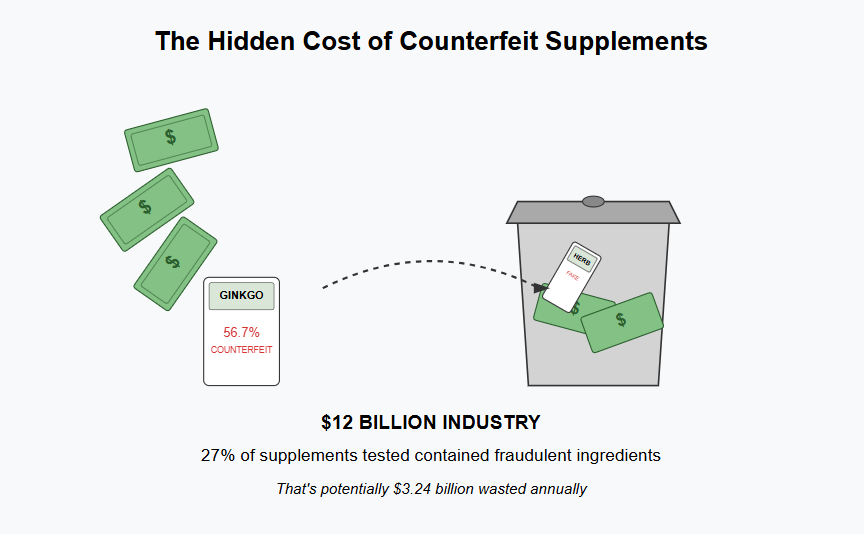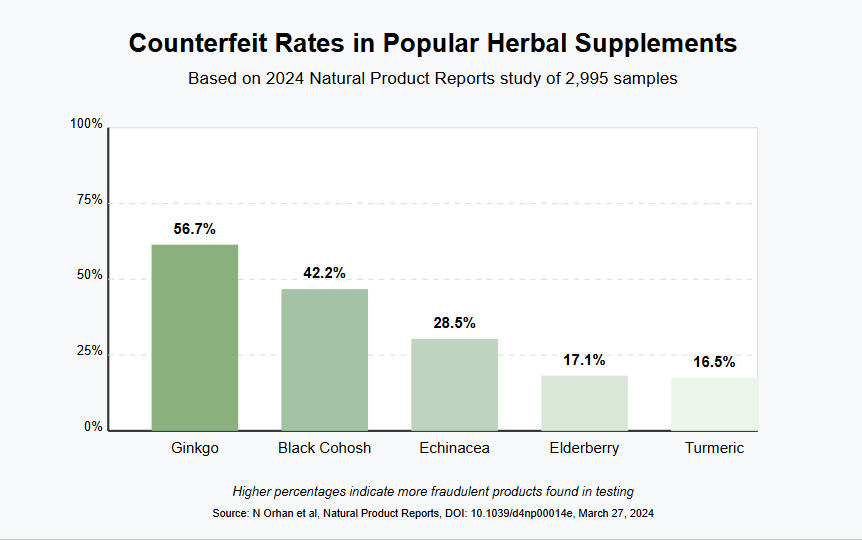Have high expectations for supplements you consume.
“I started taking echinacea for my immune system after my neighbor swore it helped her avoid getting sick all winter,” says Maria, a 43-year-old teacher from Minnesota. “But after reading about contamination, I wonder if I’ve been wasting my money on sugar pills.”
Maria isn’t alone in her concerns. In an industry exceeding $12 billion in annual retail sales and growing at nearly 10% per year, herbal supplements have become a significant part of many Americans’ health routines. Marketed as “natural” alternatives without the side effects of conventional medications, these products promise solutions to various health concerns. But recent research reveals a troubling reality that consumers should be aware of.

Affiliate Disclaimer: This site contains affiliate links, which means we receive compensation, at no extra cost to you, if you make a purchase using the links provided. We appreciate your support so much!
The Substitution Problem
A comprehensive study published in March 2024 in Natural Product Reports examined fraudulent ingredient practices in five of the most popular herbal supplements sold in the United States. The results were alarming:
- Ginkgo: 56.7% counterfeit
- Black cohosh: 42.2% falsified
- Echinacea: 28.5% mislabeled
- Elderberry: 17.1% tainted
- Turmeric: 16.5% misrepresented
“I’ve been taking ginkgo biloba for years for memory support,” explains Robert, a 67-year-old retiree. “To think that more than half of ginkgo products might be fake—it’s not just disappointing, it’s infuriating. We’re not talking about knockoff designer handbags here. This is our health!”
Overall, 27% of the 2,995 samples analyzed were found to contain substituted ingredients. This means that more than one in four herbal supplements may not contain what their labels claim.
This topic is one of the important reasons why we chose the brand of natural, herbal supplement that we have used for the past 43 years. We know that what is stated on the label is INSIDE the product AND that the ingredients are safe, able to be absorbed by our bodies, and be effective in what they were clinically proven to help us accomplish in our natural health goals. We have not found a brand like that, with the science and all of the safety and efficacy attributes of the Shaklee brand that we use.
What Is Ingredient Fraud?
Ingredient fraud refers to “the fraudulent addition of non-authentic substances or the removal and replacement of authentic substances without the purchaser’s knowledge, usually for the economic gain of the seller.” In simpler terms, it’s when cheaper, inactive ingredients are substituted for the expensive botanical ingredients promised on the label.
“I always thought ‘natural’ meant pure,” says Tanya, who manages a local health food store. “But after learning about ingredient fraud, I’ve completely changed how I stock my shelves. I now ask suppliers tough questions about their testing protocols before bringing in new products.”

How Does Contamination Occur?
The supply chain for herbal supplements follows this general path:
- Individual farmers sell raw ingredients to suppliers
- Suppliers combine raw materials into bulk botanical ingredients to sell to manufacturers
- Manufacturers create the final supplements consumers purchase
Fraudulent substitution can happen at any point in this chain:
- A farmer might sell diluted raw ingredients to a supplier with inadequate quality controls
- A supplier might sell counterfeit bulk botanicals to a manufacturer that fails to detect the problem
“It’s like a game of telephone,” explains Dr. James Rodriguez, a naturopathic physician who recommends supplements to his patients. “By the time the product reaches the consumer, what’s in the bottle might be completely different from what was harvested in the field. That’s why I only work with companies that can prove their quality control at every step.”
The Broader Implications
This study only examined five botanical ingredients, but the Botanical Adulterants Prevention Program has identified nearly 30 herbal ingredients subject to falsification, with many more yet to be tested. Additionally, the research didn’t assess contaminants like pesticides, herbicides, fungicides, and heavy metals—issues that manufacturers with poor quality control are also likely to miss.
“I started taking turmeric for joint pain after my yoga instructor suggested it,” shares Deon, a 52-year-old construction worker. “It seemed to help, but now I’m wondering if I got lucky with a genuine product or if the improvement was all in my head. How’s the average person supposed to know what’s real?”
This is something we feel good that we don’t have to worry about every day when we take our Shaklee herbal supplements. We invest a lot of money to have good health and we want to make sure what we take is not only high quality ingredients in the amount that is stated, but that they are both safe and effective plus will get absorbed in our body into our cells where they are used for our health.

Do Your Research
To protect yourself from worthless supplements that waste your money, we strongly encourage you to consider these recommendations:
1. Raise Expectations
Don’t simply trust what sales representatives, advertisements, or websites claim about product quality. Many companies that boasted about their quality controls have later been shut down by the FDA for misrepresentation.
“I used to buy whatever was on sale,” admits Lisa, a holistic health enthusiast. “Now I research companies beforehand and I’m willing to pay more for brands that have transparent practices. It’s worth it for peace of mind.”
2. Ask Questions
When considering a company’s herbal supplements, ask these critical questions:
- How many quality controls do they perform on botanical ingredients, and can these detect both contaminants and fraudulent substitutes? (Look for answers like “hundreds” and “yes”)
- How many quality controls do they conduct on final products? (Should be dozens to hundreds depending on ingredient count)
- How many clinical studies have they published in peer-reviewed journals demonstrating their products’ safety and effectiveness? (The answer should be substantial)
If you can’t find satisfactory answers to these questions through the company’s website or direct inquiry, consider looking for another supplier with better transparency.
“I emailed three different companies asking about their quality control processes,” says Michael, who takes black cohosh for stress management. “One never responded, one gave vague answers about ‘industry-standard testing,’ but the third sent me detailed information about their testing protocols and even invited me to tour their facility if I was ever in the area. Guess which one got my business?”
If you would like help learning more about a certain herbal supplement or have any questions, please get in touch. If you want to check out the Shaklee brand, we are confident you will find verification of all these essential requirements for an herbal supplement that we discussed. Not only is it important to your body, but to your wallet.
Takeaway
Despite the “natural” promise of herbal supplements, a substantial portion do not contain what their labels claim. Inadequate quality control methods throughout the industry have failed to detect counterfeit ingredients and properly authenticate botanical materials.
As Samantha, a longtime herbal supplement user puts it: “It’s a jungle out there. I’m not giving up on supplements because I’ve seen benefits, but I’m definitely becoming more discerning about what I put in my body and where I get it from.”
As a consumer, your best protection is knowledge and skepticism. No matter how impressive the claims may sound, a company’s product is only as good as the testing and scientific proof behind it.
We have written so many times here on the blog that you must be your own health advocate. Your doctor will treat your illnesses and even make some prevention recommendations, but you must do the daily work to keep good health.
Shaklee offers a free health assessment. There is no obligation to buy any products, and you do get personalized results based on the way you uniquely answer the questions about your body and your lifestyle.
Take a few moments today and find out how you can make it a goal to have optimal health.

The natural nutrition brand we recommend here on the blog are products we have personally used for the past 43+ years. We are not medical professionals. We are on a personal health journey to live younger, energized and healthy longer.
*These statements have not been evaluated by the Food and Drug Administration. These products are not intended to diagnose, treat, cure, or prevent any disease.
